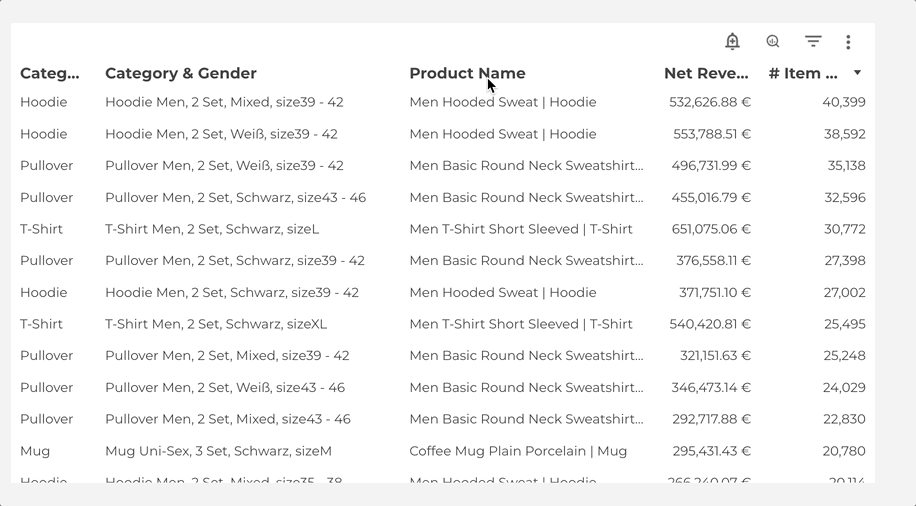
In this blog post, I want to summarize the new releases from the Google tools, that we use daily in datadice. Therefore I want to give an overview of the new features of BigQuery, Dataform, Looker Studio, Google Analytics and Google Tag Manager. Furthermore, I will focus on the releases that I consider to be the most important ones and I will also name some other changes that were made.
If you want to take a closer look, here you can find the Release Notes from BigQuery, Dataform, Looker Studio, Google Analytics & Google Tag Manager.
BigQuery
Gemini in BigQuery costs
As you hopefully already recognized, there is a code assistance available from Gemini in the SQL Editor in BigQuery. You can take a look at this blog post if you are not familiar with it.
This service has come with no costs so far. After the 27th of January 2025, this will change. Then you have 2 options to continue with the Gemini assistance in BigQuery:
- Purchase Gemini Code Assist Enterprise edition, then Gemini is still available as code assistance
- Create Enterprise Plus assignments with Gemini in BigQuery, then all Gemini assistants are still active
To get an Enterprise Plus assignment, you can start here. You need to have the correct permissions on the billing account to do it.

After the subscription is active, you need to go to the Gemini Admin page again and then under Modify Subscription select which user should get a licence.
To enable Gemini via an Enterprise Plus assignment, you start in the BigQuery Capacity Management. You need to change your existing assignment or create a new assignment. A detailed guide can be found here.
Dataplex automatic discovery
There is a new feature to scan the included data in a Cloud Storage Bucket. Afterwards it:
- groups the structured and semi-structured files into tables
- collects metadata
- creates BigLake, external or object tables in BigQuery based on the schema definition

Then you can check in the logs explorer if the scan was successful.

If that is the case and you activated “Create a BigLake table using a Cloud resource connection” the corresponding tables are available in BigQuery as well.
Note: You need to give the Cloud Dataplex Service Account access to the Cloud Storage Bucket (role: Cloud Dataplex Service Agent) before the scan.
New BigQuery ML features
Here I just want to mention the new features for BigQuery ML:
- Remote models based on Vertex AI gemini-1.5-flash and gemini-1.5-pro models, with these you can perform generative natural language tasks or other AI tasks
- Supervised tuning is also possible on these new remote models
- Using a ML.EVALUATE function for Vertex AI LLM (Pre-trained PaLM and (tuned) Gemini Models can be used for evaluation
Dataform
No further release for Dataform.
Looker Studio
Report viewers see all filters
You can filter your data with so-called controls, like a drop-down. This is a filter every user can change on their own.
Additionally, there are e.g. table filters, only editors can change and are not visible to viewers. Now you can enable that dashboard viewers can see these filters.
Here you can see how to activate and deactivate this feature.

After activation, the user can click in the chart area on the filter symbol. In the advanced view, the user can see every filter that inflicts this chart.

Suggestions in filters
For dashboard editors, there is a relief during the filter creation. After you create a new chart, page, or report filter and select the needed dimension, while typing the filter value suggestions are popping up now.

Google Analytics
Merchant Center recommendations
If you offer products on the merchant center and you linked the merchant center with the GA property, you can get now recommendations regarding your offers.
If there are any misconfigurations in the merchant center they will appear on the Property Home page, Insights hub, and other pages with a link to the problematic product.
New access log reports
There are new admin reports available in your Google Analytics property.
The API quota log report shows which user consumed API quota on the selected property. The data access report shows main changes on Account or Property level.
These 4 reports are:
- Account data access history
- Account data API quota history
- Property data access history
- Property data API quota history



Google Tag Manager
Ad click data in Local Storage
There are a lot of parties who want to get rid of cookies, especially third-party cookies. Due to that, mechanisms like the Local Storage Browser get a revival.
The Conversion Linker stores the necessary ad click information next to the Cookie also in the Browser Local Storage now.
Further Links
This post is part of the Google Data Analytics series from datadice and explains to you every month the newest features in BigQuery, Data Studio, Google Analytics and Google Tag Manager.
Check out our LinkedIn account, to get insights into our daily working life and get important updates about BigQuery, Data Studio and marketing analytics.
We also started with our own YouTube channel. We talk about important DWH, BigQuery, Data Studio and many more topics. Check out the channel here.
If you want to learn more about how to use Google Data Studio and take it to the next level in combination with BigQuery, check our Udemy course here.
If you are looking for help to set up a modern and cost-efficient data warehouse or analytical dashboards, send us an email to hello@datadice.io and we will schedule a call.






